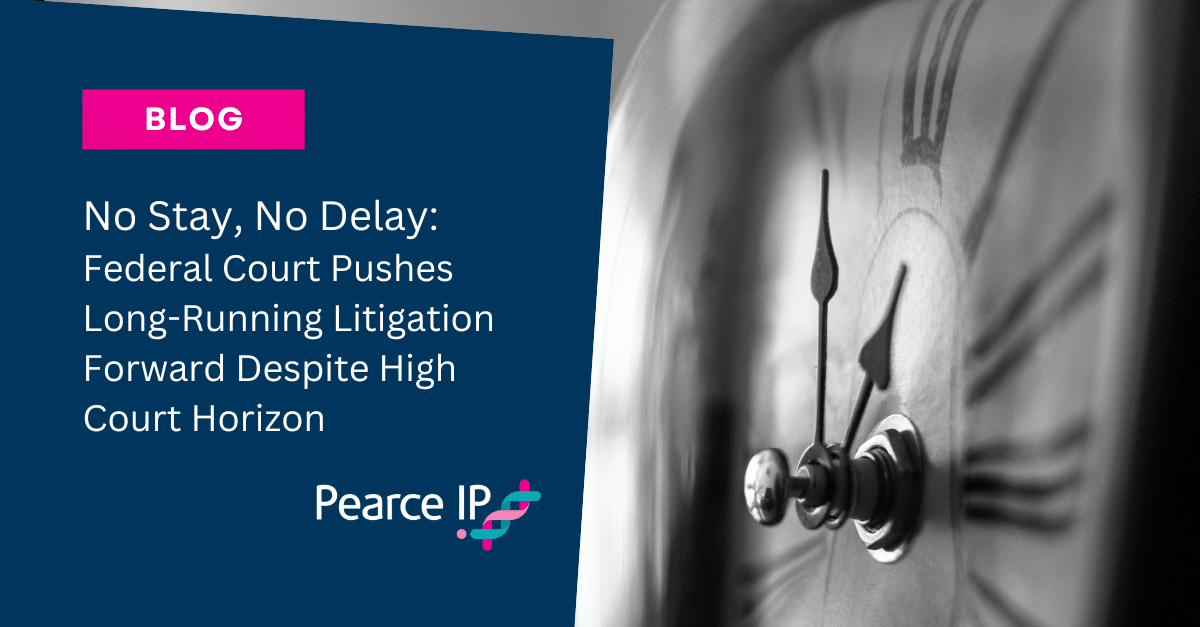| Date of decision: | 30 October 2024 |
| Body: | Federal Court |
| Adjudicator: | Justice Burley |
Background
Justice Burley has handed down a decision in a long-running dispute between Otsuka Pharmaceutical Co., Ltd (Otsuka) and Generic Health Pty Ltd (Generic Health), refusing to grant a stay of proceedings pending the delivery of judgment by the High Court in Commonwealth of Australia v Sanofi & Ors (Sanofi). On 13 November 2024, Justice Burley set down the matter for a final hearing regarding adoption of the Referee’s report in June/July 2025. Subsequently, the High Court has now delivered its decision in Sanofi.
The Otsuka/Generic Health dispute arises from a long and complex web of litigation dating back to 2012, when the Federal Court made interlocutory injunction orders preventing Generic Health from launching its generic aripiprazole products and requiring it to withdraw its application to obtain listing on the Pharmaceutical Benefits Scheme (PBS). The interlocutory injunction, granted on the usual undertaking as to damages, later became the subject of scrutiny after the patent claims were held to be invalid. Otsuka pursued an appeal in the Full Court of the Federal Court and was granted a stay of the discharge of the injunction having given further undertakings as to damages. However, Otsuka’s appeal failed. A further stay of the discharge of the injunction was granted pending a special leave application by Otsuka to appeal to the High Court. The High Court ultimately refused the special leave application.
In 2018, the Commonwealth of Australia (the Commonwealth) filed a claim on Otsuka’s undertakings, arguing that the interlocutory injunction had resulted in substantial overpayments under the PBS. In 2022, Justice Yates referred the Commonwealth’s claim to a Referee (the Hon Thomas Bathurst AC KC), who delivered a report in June 2024 finding that, on the balance of probabilities, he was not satisfied that approval to list Generic Health’s product on the market would have been granted, with the result that the Commonwealth had not established causation of loss to the requisite standard.
Key Issues and Outcome
The Commonwealth submitted that Justice Burley should stay the hearing regarding adoption of the Referee’s report pending the High Court’s decision in Sanofi. The Commonwealth’s application centred on two key arguments:
1. The Commonwealth’s primary position for opposing the adoption of the Referee’s report was that “it was not open to Otsuka on the pleadings to contend that the Minister’s delegate would have concluded that Generic Health may not have been able to meet its guarantee of supply obligations because its supplier would have experienced delays and because of those delays Generic Health’s products would not have been ready to distribute and sell within the requisite time”.
2. The Commonwealth’s secondary position was that the Referee may have applied the wrong causation test, and the upcoming High Court Decision in Sanofi may support its position on a ‘three-step’ approach to causation.
Justice Burley’s reasoning focused on three key factors:
1. First, his Honour found that the Commonwealth’s arguments based on Sanofi were both secondary and contingent on its primary argument failing. Further, if Sanofi’s primary argument failed, “then its fall-back option is that the Referee erred on the question of causation if the High Court in Sanofi decides a point in favour of the Commonwealth”. Justice Burley described this as a “contingency upon a contingency” situation.
2. Secondly, Justice Burley noted that the Commonwealth had formulated its ‘three-step causation argument’ three years earlier in the Full Court appeal, yet failed to raise this argument despite having opportunities to present it in supplementary submissions to the Referee.
3. Thirdly, Justice Burley observed that the adoption of the Referee’s report will be governed by the law as it stands at the time of determination, with the possibility of appeal if the law subsequently changes through the High Court’s decision in Sanofi. His Honour found this to be a preferrable approach rather than to delay the proceedings.
Consequently, although Justice Burley noted some factors of convenience tended in favour of a stay of proceedings, his Honour refused the Commonwealth’s application and ordered it to pay Otsuka’s costs of the application.
Implications
Justice Burley’s decision reinforces that courts will not readily delay proceedings merely because a pending decision, including a High Court decision, might provide additional guidance on legal principles. The threshold for obtaining a stay remains high, especially where the pending decision is contingent on multiple factors and the proceedings have been on foot for a long time.
Moreover, where an applicant has had previous opportunity to make submissions that form the basis of an application for stay, but failed to do so, this will weigh against its grant.
About Pearce IP
Pearce IP is a specialist firm offering intellectual property specialist lawyers and attorneys with a focus on the life sciences industries. Pearce IP and its leaders are ranked in every notable legal directory for legal, patent and trade mark excellence, including: Chambers & Partners, Legal 500, IAM Patent 1000, IAM Strategy 300, MIP IP Stars, Doyles Guide, WTR 1000, Best Lawyers, WIPR Leaders, 5 Star IP Lawyers, among others.
In 2025, Pearce IP was recognised by Australasian Lawyer and New Zealand Lawyer’s 5 Star Employer of Choice, and is the “Standout Winner” for inclusion and culture for firms with less than 100 employees. Pearce IP was awarded “IP Team of the Year” by Lawyers Weekly at the 2021 Australian Law Awards. Pearce IP is recognised by Managing IP as the only leading ANZ IP firm with a female founder, and is certified by WEConnect International as women owned.

Naomi Pearce
CEO, Executive Lawyer (AU, NZ), Patent Attorney (AU, NZ) & Trade Mark Attorney (AU)
Naomi is the founder of Pearce IP, and is one of Australia’s leading IP practitioners. Naomi is a market leading, strategic, commercially astute, patent lawyer, patent attorney and trade mark attorney, with over 25 years’ experience, and a background in molecular biology/biochemistry. Ranked in virtually every notable legal directory, highly regarded by peers and clients, with a background in molecular biology, Naomi is renown for her successful and elegant IP/legal strategies.
Among other awards, Naomi is ranked in Chambers, IAM Patent 1000, IAM Strategy 300, is a MIP “Patent Star”, and is recognised as a WIPR Leader for patents and trade marks. Naomi is the 2023 Lawyers Weekly “IP Partner of the Year”, the 2022 Lexology client choice award recipient for Life Sciences, the 2022 Asia Pacific Women in Business Law “Patent Lawyer of the Year” and the 2021 Lawyers Weekly Women in Law SME “Partner of the Year”. Naomi is the founder of Pearce IP, which commenced in 2017 and won 2021 “IP Team of the Year” at the Australian Law Awards.

Helen Macpherson
Executive, Lawyer (Head of Litigation –Australia)
Helen is a highly regarded intellectual property specialist and industry leader with more than 25 years’ experience advising on patents, plant breeder’s rights, trade marks, copyright and confidential information. She is known for her expertise in complex, high-value patent matters and leverages her technical background in biochemistry and molecular biology to work across a wide range of technologies, including inorganic, organic, physical and process chemistry, biochemistry, biotechnology (including genetics, molecular biology and virology), and physics. Helen is an active member of the Intellectual Property Committee of the Law Council of Australia and the Intellectual Property Society of Australia and New Zealand.

